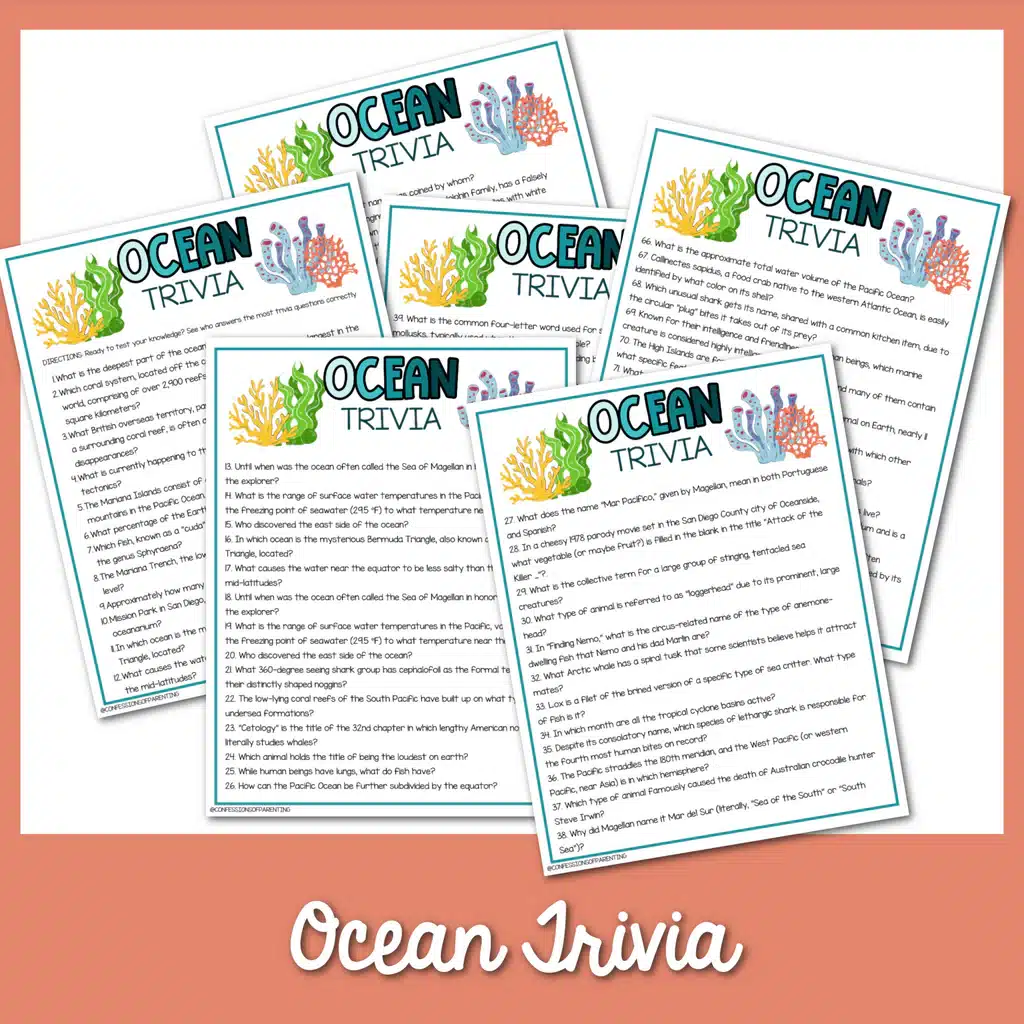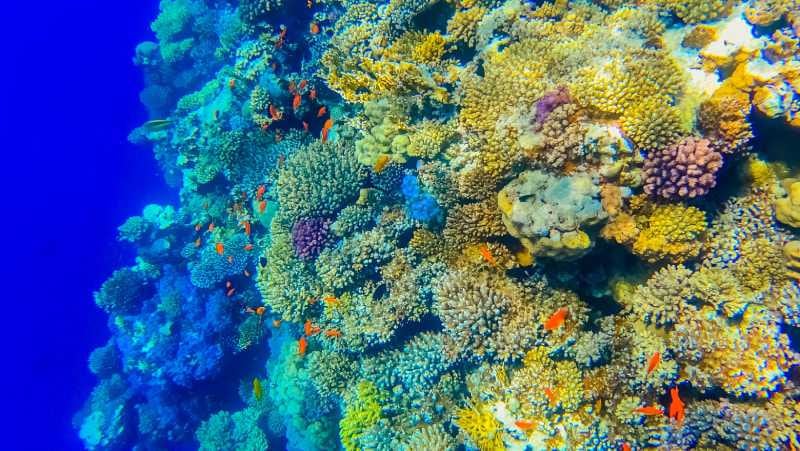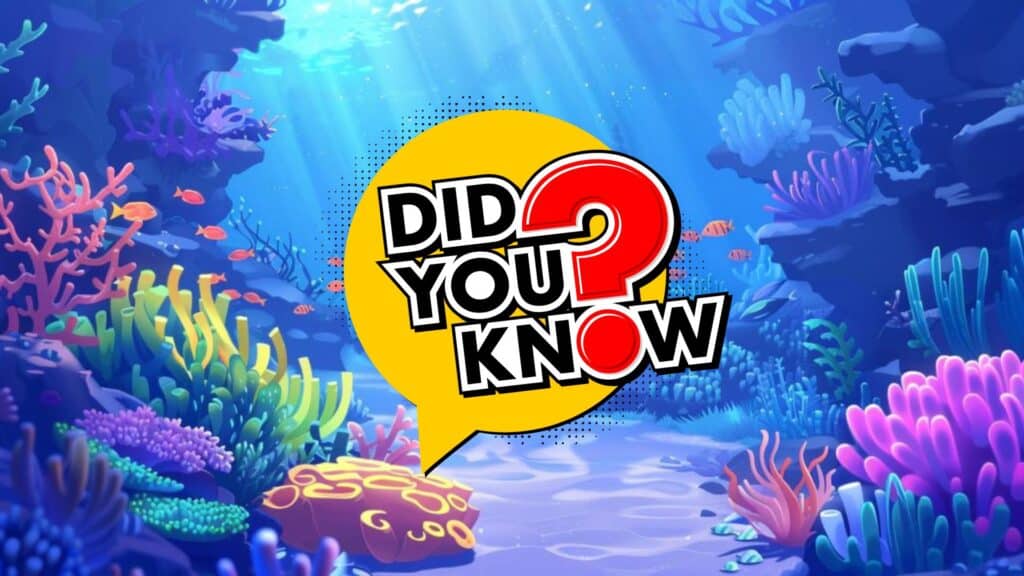Oceans are vast and mysterious, right? But when it comes to trivia about them, you might feel lost at sea.
It’s frustrating to realize you don’t know as much as you thought about these incredible bodies of water that cover most of our planet.
Well, get ready to dive into these fascinating ocean facts! We’ve compiled a list of over 171+ mind-blowing ocean trivia questions that will amaze you and your friends.
From the depths of the Mariana Trench to the colorful world of coral reefs, you’ll discover surprising truths about the creatures, ecosystems, and phenomena that make our oceans so attractive.
Prepare to have your knowledge of the big blue expanded like never before!
Surprising Ocean Trivia Questions & Answers

1. What is the largest ocean in the world?
A: The Pacific Ocean.
2. How much of the Earth’s surface is covered by oceans?
A: Approximately 71%.
3. What is the deepest known point in the Earth’s oceans?
A: The Challenger Deep in the Mariana Trench.
4. Which ocean is the saltiest?
A: The Atlantic Ocean.
5. What is the longest mountain range in the world, and where is it located?
A: The Mid-Oceanic Ridge, located underwater.
6. What causes ocean tides?
A: The gravitational pull of the moon and sun.
7. What is the largest marine mammal?
A: The blue whale.
8. Which ocean is the smallest?
A: The Arctic Ocean.
9. What percentage of life on Earth is found in the oceans?
A: An estimated 50-80% of all life on Earth.
10. What is the largest coral reef system in the world?
A: The Great Barrier Reef.
11. What is the term for a fear of the ocean?
A: Thalassophobia.
12. Which ocean is home to the Bermuda Triangle?
A: The Atlantic Ocean.
13. What is the largest sea in the world?
A: The South China Sea.
14. What is the world’s largest ocean current?
A: The Antarctic Circumpolar Current.
15. What is the most common color of the ocean?
A: Blue.
16. What is the term for the zone where freshwater from rivers meets the saltwater of the ocean?
A: Estuary.
17. What is the world’s largest shark?
A: The whale shark.
18. What is the scientific term for the study of oceans?
A: Oceanography.
19. What is the average depth of the Earth’s oceans?
A: Around 12,100 feet (3,688 meters).
20. Which ocean surrounds Antarctica?
A: The Southern Ocean.
21. What is the most venomous marine creature?
A: The box jellyfish.
22. What is the primary cause of ocean acidification?
A: Absorption of carbon dioxide from the atmosphere.
23. Which ocean is the warmest?
A: The Indian Ocean.
24. What is the largest sea turtle species?
A: The leatherback sea turtle.
25. What is the term for a group of jellyfish?
A: A smack of jellyfish.
26. What is the largest type of seaweed?
A: Giant kelp.
27. Which ocean is the deepest on average?
A: The Pacific Ocean.
28. What is the most common type of marine pollution?
A: Plastic pollution.
29. What is the term for the area where a river meets the ocean?
A: The mouth of the river.
30. Which ocean basin has the most islands?
A: The Pacific Ocean.
31. What is the largest species of crab?
A: The Japanese spider crab.
32. What is the term for a wave caused by an underwater earthquake or landslide?
A: A tsunami.
33. Which ocean is the youngest geologically?
A: The Atlantic Ocean.
34. What is the largest species of octopus?
A: The giant Pacific octopus.
35. What is the term for a group of sharks?
A: A shiver of sharks.
36. What is the primary cause of coral bleaching?
A: Rising ocean temperatures due to climate change.
37. Which ocean has the most oil and gas reserves?
A: The Persian Gulf, which is part of the Indian Ocean.
38. What is the largest species of jellyfish?
A: The lion’s mane jellyfish.
39. What is the term for the zone where the ocean meets the land?
A: The coastal zone or littoral zone.
40. Which ocean has the highest average salinity?
A: The Mediterranean Sea, which is part of the Atlantic Ocean.
41. What is the largest species of marine mammal after the blue whale?
A: The fin whale.
42. What is the term for a group of rays?
A: A fever of rays.
43. What is the most diverse marine ecosystem?
A: Coral reefs.
44. Which ocean has the most phytoplankton?
A: The Southern Ocean.
45. What is the largest species of squid?
A: The colossal squid.
46. What is the term for a group of whales?
A: A pod of whales.
47. What is the most endangered marine mammal?
A: The vaquita, a species of porpoise.
48. Which ocean has the most shipping traffic?
A: The Atlantic Ocean.
49. What is the largest species of starfish?
A: The sunflower sea star.
50. What is the term for the zone where ocean currents converge?
A: The convergence zone.
51. Which ocean is home to the world’s largest mangrove forest?
A: The Bay of Bengal, which is part of the Indian Ocean.
52. What is the largest species of seahorse?
A: The Pacific seahorse.
53. What is the term for a group of dolphins?
A: A pod of dolphins.
54. What is the most common type of marine debris?
A: Cigarette butts.
55. Which ocean has the most coral reefs?
A: The Pacific Ocean.
56. What is the largest species of marine reptile?
A: The saltwater crocodile.
57. What is the term for the zone where ocean water sinks?
A: The downwelling zone.
58. Which ocean is home to the world’s largest seagrass meadow?
A: The Sargasso Sea, which is part of the Atlantic Ocean.
59. What is the largest species of marine bird?
A: The wandering albatross.
60. What is the term for a group of seals?
A: A colony of seals.
61. What is the most endangered marine invertebrate?
A: The coral species, staghorn coral.
62. Which ocean has the most undersea volcanoes?
A: The Pacific Ocean.
63. What is the largest species of marine snail?
A: The Australian trumpet snail.
64. What is the term for the zone where ocean water upwells?
A: The upwelling zone.
65. Which ocean is home to the world’s largest kelp forest?
A: The Southern Ocean.
66. What is the largest species of marine iguana?
A: The Galapagos marine iguana.
67. What is the term for a group of sea turtles?
A: A bale of sea turtles.
68. What is the most toxic marine algae?
A: The red tide algae.
69. Which ocean has the most methane hydrates?
A: The Arctic Ocean.
70. What is the largest species of marine worm?
A: The giant tube worm.
71. What is the term for the zone where ocean water mixes vertically?
A: The mixed layer.
72. Which ocean is home to the world’s largest salt marsh?
A: The Gulf of Mexico, which is part of the Atlantic Ocean.
73. What is the largest species of marine sponge?
A: The barrel sponge.
74. What is the term for a group of manatees?
A: An aggregation of manatees.
75. What is the most invasive marine species?
A: The lionfish.
76. Which ocean has the most seamounts?
A: The Pacific Ocean.
77. What is the largest species of marine spider?
A: The sea spider.
78. What is the term for the zone where ocean water is the densest?
A: The pycnocline.
79. Which ocean is home to the world’s largest fjord?
A: The Arctic Ocean.
80. What is the largest species of marine ant?
A: The maritime ant.
81. What is the term for a group of sea otters?
A: A raft of sea otters.
82. What is the most endangered marine fish?
A: The Nassau grouper.
83. Which ocean has the most hydrothermal vents?
A: The Pacific Ocean.
84. What is the largest species of marine isopod?
A: The giant isopod.
85. What is the term for the zone where ocean water is the coldest?
A: The thermocline.

86. Which ocean is home to the world’s largest coastal lagoon?
A: The Caspian Sea, which is technically a lake but often considered a part of the Atlantic Ocean basin.
87. What is the largest species of marine copepod?
A: The giant copepod.
88. What is the term for a group of sea stars?
A: A galaxy of sea stars.
89. What is the most endangered marine mammal in the United States?
A: The North Atlantic right whale.
90. Which ocean has the most tsunamis?
A: The Pacific Ocean.
91. What is the largest species of marine tardigrade?
A: The giant tardigrade.
92. What is the term for the zone where ocean water is the most acidic?
A: The carbonate compensation depth.
93. Which ocean is home to the world’s largest barrier island?
A: The Gulf of Mexico, which is part of the Atlantic Ocean.
94. What is the largest species of marine ostracod?
A: The giant ostracod.
95. What is the term for a group of sea slugs?
A: A herd of sea slugs.
96. What is the most endangered marine reptile?
A: The Kemp’s ridley sea turtle.
97. Which ocean has the most rogue waves?
A: The Indian Ocean.
98. What is the largest species of marine nematode?
A: The giant nematode.
99. What is the term for the zone where ocean water has the highest pressure?
A: The hadal zone.
100. Which ocean is home to the world’s largest coastal sand dune?
A: The Namib Desert, which borders the Atlantic Ocean.
101. What is the largest species of marine rotifer?
A: The giant rotifer.
102. What is the term for a group of sea urchins?
A: A herd of sea urchins.
103. What is the most endangered marine crustacean?
A: The Christmas Island red crab.
104. Which ocean has the most submarine canyons?
A: The Atlantic Ocean.
105. What is the largest species of marine bryozoan?
A: The giant bryozoan.
106. What is the term for the zone where ocean water has the lowest density?
A: The epipelagic zone.
107. Which ocean is home to the world’s largest coastal wetland?
A: The Pantanal, which is part of the Atlantic Ocean basin.
108. What is the largest species of marine barnacle?
A: The giant barnacle.
109. What is the term for a group of sea cucumbers?
A: A herd of sea cucumbers.
110. What is the most endangered marine mollusk?
A: The giant clam.
111. Which ocean has the most undersea canyons?
A: The Pacific Ocean.
112. What is the largest species of marine polychaete worm?
A: The giant polychaete worm.
113. What is the term for the zone where ocean water has the highest salinity?
A: The halocline.
114. Which ocean is home to the world’s largest coastal desert?
A: The Atacama Desert, which borders the Pacific Ocean.
115. What is the largest species of marine hydrozoan?
A: The giant siphonophore.
116. What is the term for a group of sea anemones?
A: A colony of sea anemones.
117. What is the most endangered marine plant?
A: The seagrass species, Johnson’s seagrass.
118. Which ocean has the most deep-sea trenches?
A: The Pacific Ocean.
119. What is the largest species of marine nemertean worm?
A: The giant nemertean worm.
120. What is the term for the zone where ocean water has the highest oxygen content?
A: The oxygen minimum zone.
121. Which ocean is home to the world’s largest coastal cave?
A: The South China Sea, which is part of the Pacific Ocean.
122. What is the largest species of marine foraminiferan?
A: The giant foraminiferan.
123. What is the term for a group of sea squirts?
A: A colony of sea squirts.
124. What is the most endangered marine bird?
A: The New Zealand fairy tern.
125. Which ocean has the most deep-sea vents?
A: The Atlantic Ocean.
126. What is the largest species of marine flatworm?
A: The giant flatworm.
127. What is the term for the zone where ocean water has the lowest oxygen content?
A: The oxygen minimum zone.
128. Which ocean is home to the world’s largest coastal karst formation?
A: The Adriatic Sea, which is part of the Mediterranean Sea and the Atlantic Ocean.
129. What is the largest species of marine acorn worm?
A: The giant acorn worm.
130. What is the term for a group of sea pens?
A: A field of sea pens.
131. What is the most endangered marine shark?
A: The great hammerhead shark.
132. Which ocean has the most mid-ocean ridges?
A: The Atlantic Ocean.
133. What is the largest species of marine kinorhynch?
A: The giant kinorhynch.
134. What is the term for the zone where ocean water has the highest nutrient content?
A: The nutricline.
135. Which ocean is home to the world’s largest coastal cliff?
A: The Southern Ocean.
136. What is the largest species of marine loriciferan?
A: The giant loriciferan.
137. What is the term for a group of sea lilies?
A: A meadow of sea lilies.
138. What is the most endangered marine mammal in Europe?
A: The Mediterranean monk seal.
139. Which ocean has the most abyssal plains?
A: The Pacific Ocean.
140. What is the largest species of marine priapulid worm?
A: The giant priapulid worm.
141. What is the term for the zone where ocean water has the lowest nutrient content?
A: The oligotrophic zone.
142. Which ocean is home to the world’s largest coastal arch?
A: The Indian Ocean.
143. What is the largest species of marine gastrotrich?
A: The giant gastrotrich.
144. What is the term for a group of sea fans?
A: A forest of sea fans.
145. What is the most endangered marine turtle?
A: The Kemp’s ridley sea turtle.
146. Which ocean has the most seamount chains?
A: The Pacific Ocean.
147. What is the largest species of marine gnathostomulid?
A: The giant gnathostomulid.
148. What is the term for the zone where ocean water has the highest silica content?
A: The silicacline.
149. Which ocean is home to the world’s largest coastal stack?
A: The Atlantic Ocean.
150. What is the largest species of marine cycliophoran?
A: The giant cycliophoran.
151. What is the term for a group of sea whips?
A: A grove of sea whips.
152. What is the most endangered marine fish in the Great Barrier Reef?
A: The speartooth shark.
153. Which ocean has the most underwater plateaus?
A: The Indian Ocean.
154. What is the largest species of marine xenoturbellid?
A: The giant xenoturbellid.
155. What is the term for the zone where ocean water has the lowest silica content?
A: The silica-depleted zone.
156. Which ocean is home to the world’s largest coastal tombolo?
A: The Pacific Ocean.
157. What is the largest species of marine pycnogonid?
A: The giant sea spider.
158. What is the term for a group of sea daisies?
A: A bed of sea daisies.
159. What is the most endangered marine mammal in Asia?
A: The Yangtze finless porpoise.
160. Which ocean has the most guyots?
A: The Pacific Ocean.
161. What is the largest species of marine entoproct?
A: The giant entoproct.
162. What is the term for the zone where ocean water has the highest iron content?
A: The ferricline.
163. Which ocean is home to the world’s largest coastal blowhole?
A: The Southern Ocean.
164. What is the largest species of marine sipunculid worm?
A: The giant peanut worm.
165. What is the term for a group of sea pansies?
A: A bed of sea pansies.
166. What is the most endangered marine bird in the Southern Hemisphere?
A: The New Zealand storm petrel.
167. Which ocean has the most black smokers?
A: The Pacific Ocean.
168. What is the largest species of marine chaetognath?
A: The giant arrow worm.
169. What is the term for the zone where ocean water has the lowest iron content?
A: The iron-limited zone.
170. Which ocean is home to the world’s largest coastal geyser?
A: The Atlantic Ocean.
171. What is the largest species of marine hemichordate?
A: The giant acorn worm.
172. What is the term for a group of sea mice?
A: A nest of sea mice.
Conclusion
In conclusion, the ocean is a collection of fascinating facts and mind-blowing discoveries.
However, by exploring the ocean’s wonders, we gain a greater appreciation for its crucial role in sustaining life on Earth.
As we continue to learn more about this large world, we must work together to protect and preserve our oceans for future generations.
So, the next time you find yourself near the sea, take a moment to marvel at the incredible world beneath the waves and share your newfound knowledge with others.
Together, we can inspire a greater love and respect for our amazing oceans.


















